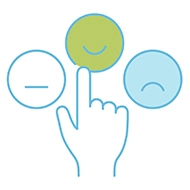Pediatric Psychotherapy

At Mind Institute, we take a positive approach to children’s mental health, understanding that early-life well-being shapes future outcomes. Our dedicated team provides compassionate psychotherapy services, supporting children and families on their journey to improved mental health.
Our Approach:
- Empower you and your child with knowledge and tools to address mental health concerns effectively
- Set attainable goals for your child's progress and development
- Work collaboratively with you and your child to achieve these goals
We are committed to understanding the underlying factors contributing to your child’s condition, whether biological, environmental, psychological, or academic. Our adaptable care approach ensures we find effective strategies that promote your child’s well-being and progress.
Pediatric Psychotherapy Pathways:
- Cognitive Behavioral Therapy (CBT): CBT is a structured form of psychotherapy that helps children recognize and modify negative thought patterns. CBT empowers children to develop more positive responses to challenges and fosters a clearer perspective on life.
- Acceptance and Commitment Therapy (ACT): ACT enables children to comprehend and embrace their internal emotions. Our therapists guide children to leverage their enhanced emotional insight to commit to a positive progression forward.
- Family Therapy: Family Therapy concentrates on enhancing family dynamics through constructive means, exploring communication patterns, and offering guidance and knowledge. Family therapy sessions involve not only the child but also parents, siblings, and grandparents.
- Parent-Child Interaction Therapy (PCIT): PCIT assists parents and children facing behavioral issues or difficulties in establishing connections through interactive coaching sessions. Therapists facilitate parents' interactions with their children, steering families toward positive and enriching exchanges.
- Play Therapy: Play Therapy employs toys, blocks, dolls, puppets, drawings, and games to aid children in recognizing, articulating, and expressing their emotions. The therapist observes the child's play materials usage, identifying underlying themes or patterns to comprehend the child's challenges. Through a blend of conversation and play, children gain an opportunity to enhance their comprehension and management of conflicts, emotions, and behavior.
- Neuropsychological Rehabilitation: The rehabilitation of sensory and cognitive functions typically involves techniques that either retrain existing neural pathways or establish new ones. This approach aims to restore or enhance neurocognitive functioning that may have been compromised by disease or trauma.
- Brain Training/Cognitive Training: Brain training, also referred to as cognitive training, encompasses a series of regular activities designed to uphold or enhance various cognitive abilities, including comprehension, memory, reasoning, creativity, executive functioning, and learning skills.
Pediatric Psychotherapy supports children and adolescents in managing:
- Anxiety disorders
- Mood disorders
- Obsessive-Compulsive Disorder (OCD)
- Trauma and Stress-related disorders
- Attention-Deficit/Hyperactivity Disorder (ADHD)
- Disruptive behavior disorders
- Elimination disorders
- Substance use disorders
- Body image issues
- Psychosomatic issues
- Grief and loss
- Low self-esteem and self-worth
- School-related issues
- Anger and aggression management
- Social skills deficits
- Family-related challenges
- Behavioral persistence/maintenance
- Neuropsychological rehabilitation of children and adolescents with various medical conditions
- Learning disorders/difficulties
- Cognitive difficulties
- Intellectual disabilities/delays
- Developmental concerns
Additional Psychotherapy Services:
At Mind Institute, our psychologists also specialize in cognitive training that is meticulously crafted to assist children with lower IQs who are confronting cognitive obstacles and related learning difficulties. Our program is oriented toward enhancing their cognitive capacities, enabling them to overcome constraints in learning and personal development. Additionally, we provide targeted neuropsychological rehabilitation for children who have experienced brain damage, trauma, and other medical conditions, facilitating the revitalization and enhancement of sensory and cognitive functions through the retraining of existing neural pathways or the creation of new ones. This approach fosters the recovery of abilities and an overarching enrichment of cognitive performance.
Choose Mind Institute for Comprehensive Mental Health Support:
Our commitment to your child’s well-being extends beyond therapy. We offer comprehensive assessments to identify strengths and weaknesses, empowering you to help your child reach their full potential. Our personalized approach ensures each child receives the support they need, promoting growth and success.
